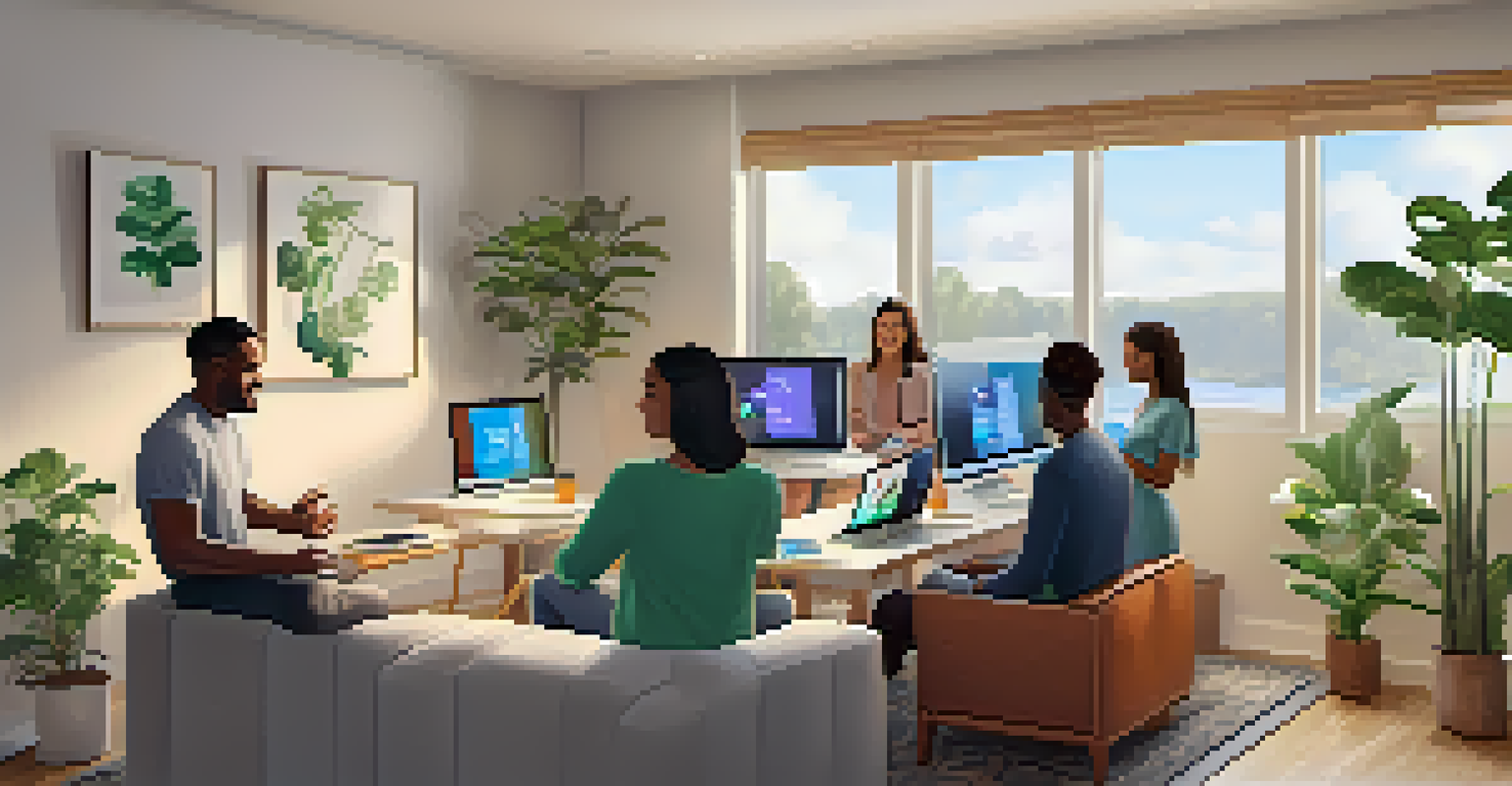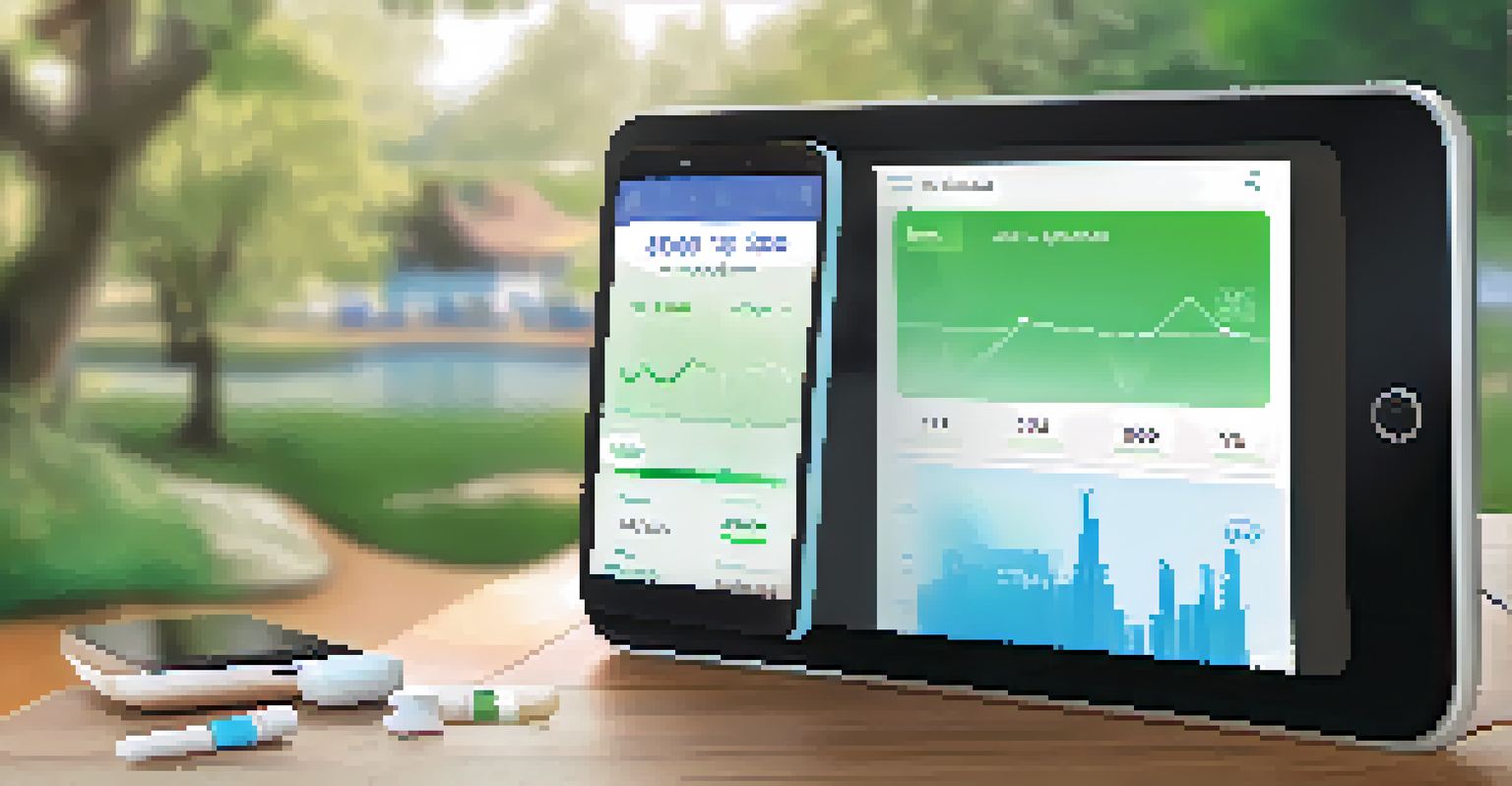How Health Apps are Empowering Patients in Their Care

Understanding the Rise of Health Apps in Patient Care
In recent years, health apps have surged in popularity, driven by advancements in technology and the increasing need for personal health management. Patients are no longer passive recipients of care; they are becoming active participants in their health journeys. With a few taps on their smartphones, individuals can track their vital signs, manage medications, and even schedule appointments, all from the comfort of their homes.
The greatest wealth is health.
This shift towards digital health tools is not just about convenience; it's about empowerment. By providing easy access to health information and resources, these apps enable patients to take charge of their well-being. For instance, someone managing diabetes can monitor their blood sugar levels daily and adjust their diet accordingly, leading to more informed choices.
Moreover, the COVID-19 pandemic has accelerated this trend, as many people sought alternative ways to access healthcare. Health apps have filled this gap, allowing for remote consultations and continuous health monitoring. As a result, patients are finding themselves more engaged in their care than ever before.
Tracking Health Metrics: A Game Changer for Patients
One of the most significant benefits of health apps is the ability to track various health metrics in real-time. Whether it's monitoring heart rate with a smartwatch or logging symptoms through a dedicated app, patients can gain insights into their health that were previously unavailable. This data-driven approach helps individuals understand their conditions better and make informed decisions.

For example, a fitness app can motivate someone to increase their physical activity by setting daily goals and providing feedback on their progress. When patients see tangible results, such as improved stamina or weight loss, it fosters a sense of accomplishment and encourages them to maintain healthy habits.
Health Apps Empower Patients
Health apps are transforming patients from passive recipients of care into active participants in managing their health.
Additionally, these metrics can be shared with healthcare providers, enhancing communication and collaboration. Doctors can access a patient’s health data before consultations, allowing them to provide more personalized care based on the individual’s history and trends.
Medication Management Made Easy with Health Apps
Managing medications can be a daunting task for many patients, especially those with chronic conditions requiring multiple prescriptions. Health apps streamline this process by offering features like pill reminders, dosage tracking, and refill notifications. This technology helps ensure that patients adhere to their medication schedules, ultimately improving health outcomes.
Health is not just about what you're eating. It's also about what you're thinking and saying.
Imagine a busy professional juggling work and family commitments; forgetting to take a medication can lead to complications. With a medication management app, they receive timely alerts that remind them when it's time to take their pills, significantly reducing the likelihood of missed doses. This small nudge can make a significant difference in managing their health.
Moreover, some apps provide educational resources about medications, including potential side effects and interactions, empowering patients to be proactive and informed. This knowledge helps individuals feel more in control of their treatment plans and fosters a stronger partnership with their healthcare providers.
Telehealth Integration: Bridging the Gap
The integration of telehealth services into health apps has revolutionized patient care. Patients can now consult with healthcare professionals via video calls, eliminating the need for physical visits. This convenience is particularly beneficial for those living in remote areas or for individuals with mobility challenges, making healthcare more accessible than ever.
For instance, a patient living in a rural community can have a virtual appointment with a specialist hundreds of miles away, saving time and travel costs. These telehealth features also allow for quicker follow-ups and ongoing support, which can be crucial for patients managing chronic conditions.
Real-Time Health Tracking Benefits
By allowing patients to monitor health metrics in real-time, health apps enable informed decision-making and better health outcomes.
Additionally, the ability to access healthcare remotely means that patients can receive care in a comfortable environment, reducing anxiety often associated with doctor visits. This change not only enhances the patient experience but also improves adherence to treatment plans.
Personalized Health Insights for Better Decision-Making
Health apps are increasingly using artificial intelligence (AI) to provide personalized health insights. By analyzing user data, these apps can offer tailored recommendations that align with an individual's health goals. For example, a weight loss app might suggest meal plans based on dietary preferences and food restrictions.
This personalization is crucial because everyone's health journey is unique. By receiving suggestions that are relevant to their specific needs, patients are more likely to engage with their health management strategies. This tailored approach can lead to better adherence and ultimately, improved health outcomes.
Furthermore, personalized insights help patients identify patterns in their health behaviors, such as triggers for anxiety or the impact of diet on mood. This level of understanding fosters a stronger connection between individuals and their health, empowering them to make more informed choices.
Connecting with Communities for Support and Motivation
Health apps are not just tools for tracking; they are also platforms for community building. Many apps include features that allow users to connect with others who share similar health challenges. This sense of community can be incredibly motivating, as individuals find support and encouragement from those who understand their experiences.
For example, a patient recovering from addiction might join a support group through an app, where they can share their journey and receive guidance from peers. This connection can provide a sense of belonging and accountability, which is often essential for recovery and health maintenance.
Community Support Enhances Recovery
Health apps foster community connections that provide motivation and support, crucial for those facing chronic health challenges.
Moreover, these communities can offer valuable resources, such as tips for managing specific conditions or success stories that inspire others. By fostering connections, health apps not only empower patients but also help combat feelings of isolation that often accompany chronic health issues.
The Future of Health Apps: Innovations on the Horizon
As technology continues to evolve, the future of health apps looks promising, with innovations that could further empower patients. Emerging trends include the use of wearable technology and continuous health monitoring, which can provide real-time feedback and alerts. Imagine a world where your smartwatch could notify you of irregular heartbeats before you even notice them.
Additionally, advancements in data security and privacy will enhance user trust, ensuring that patients feel safe while sharing their health information. As concerns about data breaches grow, developers are prioritizing robust security measures, which will be crucial for widespread adoption.

Furthermore, we can expect more integration with health systems and insurance providers, making it easier for patients to access their health records and receive personalized care. This interconnectedness will empower patients by giving them greater visibility into their health journeys and fostering a collaborative approach to care.